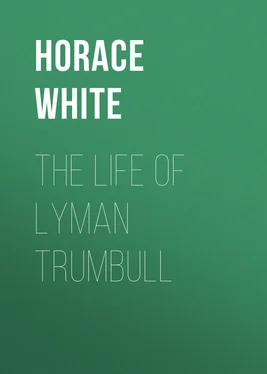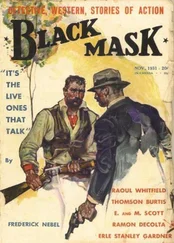Horace White - The Life of Lyman Trumbull
Здесь есть возможность читать онлайн «Horace White - The Life of Lyman Trumbull» — ознакомительный отрывок электронной книги совершенно бесплатно, а после прочтения отрывка купить полную версию. В некоторых случаях можно слушать аудио, скачать через торрент в формате fb2 и присутствует краткое содержание. Жанр: foreign_prose, История, foreign_edu, foreign_antique, на английском языке. Описание произведения, (предисловие) а так же отзывы посетителей доступны на портале библиотеки ЛибКат.
- Название:The Life of Lyman Trumbull
- Автор:
- Жанр:
- Год:неизвестен
- ISBN:нет данных
- Рейтинг книги:5 / 5. Голосов: 1
-
Избранное:Добавить в избранное
- Отзывы:
-
Ваша оценка:
- 100
- 1
- 2
- 3
- 4
- 5
The Life of Lyman Trumbull: краткое содержание, описание и аннотация
Предлагаем к чтению аннотацию, описание, краткое содержание или предисловие (зависит от того, что написал сам автор книги «The Life of Lyman Trumbull»). Если вы не нашли необходимую информацию о книге — напишите в комментариях, мы постараемся отыскать её.
The Life of Lyman Trumbull — читать онлайн ознакомительный отрывок
Ниже представлен текст книги, разбитый по страницам. Система сохранения места последней прочитанной страницы, позволяет с удобством читать онлайн бесплатно книгу «The Life of Lyman Trumbull», без необходимости каждый раз заново искать на чём Вы остановились. Поставьте закладку, и сможете в любой момент перейти на страницу, на которой закончили чтение.
Интервал:
Закладка:
Trumbull was now forty-one years of age. He had gained the confidence of the people among whom he lived to such a degree that his reëlection to the supreme bench in 1852 had been unanimous. He now joined with Gustave Koerner and other Democrats in organizing the Eighth Congressional District in opposition to Douglas and his Nebraska Bill. Although this district had been originally a slaveholding region, it contained a large infusion of German immigration, which had poured into it in the years following the European uprising of 1848. Of the thirty thousand Germans in Illinois in 1850, Reynolds estimated that fully eighteen thousand had settled in St. Clair County. These immigrants had at first attached themselves to the Democratic party, because its name signified government by the people. When, however, it became apparent to them that the Democratic party was the ally of slavery, they went over to the opposition in shoals, under the lead of Koerner and Hecker. Koerner was at that time lieutenant-governor of the state, and his separation from the party which had elected him made a profound impression on his fellow countrymen. Hecker was a fervid orator and political leader, and later a valiant soldier in the Union army.
The Eighth Congressional District then embraced the counties of Bond, Clinton, Jefferson, Madison, Marion, Monroe, Randolph, St. Clair, and Washington. It was the strongest Democratic district in the state, but political parties had been thrown into such disorder by the Nebraska Bill that no regular nominations for Congress were made by either Whigs or Democrats. Trumbull announced himself as an anti-Nebraska Democratic candidate. He had just recovered from the most severe and protracted illness of his life and was in an enfeebled condition in consequence, but he made a speaking campaign throughout the district, and was elected by 7917 votes against 5306 cast for Philip B. Fouke, who ran independently as a Douglas Democrat. This victory defeated so many of the followers of Douglas who were candidates for the legislature that it became possible to elect a Senator of the United States in opposition to the regular Democracy.
If political honors were awarded according to the rules of quantum meruit , Abraham Lincoln would have been chosen Senator as the successor of James Shields at this juncture, since he had contributed more than any other person to the anti-Nebraska victory in the state. He had been out of public life since his retirement from the lower house of Congress in 1848. Since then he had been a country lawyer with a not very lucrative practice, but a very popular story-teller. He belonged to the Whig party, and had followed Clay and Webster in supporting the Compromise measures of 1850, including the new Fugitive Slave Law, for, although a hater of slavery himself, he believed that the Constitution required the rendition of slaves escaping into the free states. He was startled by the repeal of the Missouri Compromise. Without that awakening, he would doubtless have remained in comparative obscurity. He would have continued riding the circuit in central Illinois, making a scanty living as a lawyer, entertaining tavern loungers with funny stories, and would have passed away unhonored and unsung. He was now aroused to new activity, and when Douglas came to Springfield at the beginning of October to defend his Nebraska Bill on the hustings, Lincoln replied to him in a great speech, one of the world's masterpieces of argumentative power and moral grandeur, which left Douglas's edifice of "Popular Sovereignty" a heap of ruins. This was the first speech made by him that gave a true measure of his qualities. It was the first public occasion that laid a strong hold upon his conscience and stirred the depths of his nature. It was also the first speech of his that the writer of this book, then twenty years of age, ever listened to. The impression made by it has lost nothing by the lapse of time. In Lincoln's complete writings it is styled the Peoria speech of October 16, 1854, as it was delivered at Peoria, after the Springfield debate, and subsequently written out by Lincoln himself for publication in the Sangamon Journal . The Peoria speech contained a few passages of rejoinder to Douglas's reply to his Springfield speech. In other respects they were the same. 18 18 Some testimony as to the effect produced upon Douglas himself by this speech was supplied to me long afterwards from a trustworthy quarter in the following letter:— New York, Dec. 7, 1908. My dear Mr. White: In 1891, at his office in Chicago, Mr. W. C. Gowdy told me that Judge Douglas spent the night with him at his house preceding his debate with Mr. Lincoln; that after the evening meal Judge Douglas exhibited considerable restlessness, pacing back and forth upon the floor of the room, evidently with mental preoccupation. The attitude of Judge Douglas was so unusual that Mr. Gowdy felt impelled to address him, and said: "Judge Douglas, you appear to be ill at ease and under some mental agitation; it cannot be that you have any anxiety with reference to the outcome of the debate you are to have with Mr. Lincoln; you cannot have any doubt of your ability to dispose of him." Whereupon Judge Douglas, stopping abruptly, turned to Mr. Gowdy and said, with great emphasis: "Yes, Gowdy, I am troubled over the progress and outcome of this debate. I have known Lincoln for many years, and I have continually met him in debate. I regard him as the most difficult and dangerous opponent that I have ever met and I have serious misgivings as to what may be the result of this joint debate." These in substance, and almost in exact phraseology, are the words repeated to me by Mr. Gowdy. Faithfully yours, Francis Lynde Stetson. Mr. Gowdy was a state senator in 1854 and his home was at or near Peoria. There was no joint debate between Lincoln and Douglas at or near Gowdy's residence, except that of 1854.
It was this speech that drew upon Lincoln the eyes of the scattered elements of opposition to Douglas. These elements were heterogeneous and in part discordant. The dividing line between Whigs and Democrats still ran through every county in the state, but there was a third element, unorganized as yet, known as "Free-Soilers," who traced their lineage back to James G. Birney and the campaign of 1844. These were numerous and active in the northern counties, but south of the latitude of Springfield they dwindled away rapidly. The Free-Soilers served as a nucleus for the crystallization of the Republican party two years later, but in 1854 the older organizations, although much demoralized, were still unbroken. Probably three fourths of the Whigs were opposed to the Nebraska Bill in principle, and half of the remainder were glad to avail themselves of any rift in the Democratic party to get possession of the offices. There was still a substantial fraction of the party, however, which feared any taint of abolitionism and was likely to side with Douglas in the new alignment.
The legislature consisted of one hundred members—twenty-five senators and seventy-five representatives. Twelve of the senators had been elected in 1852 for a four years' term, and thirteen were elected in 1854. Among the former were N. B. Judd, of Chicago, John M. Palmer, of Carlinville, and Burton C. Cook, of Ottawa, three Democrats who had early declared their opposition to the Nebraska Bill. The full Senate was composed of nine Whigs, thirteen regular Democrats, and three anti-Nebraska Democrats. A fourth holding-over senator (Osgood, Democrat) represented a district which had given an anti-Nebraska majority in this election. One of the Whig members (J. L. D. Morrison) of St. Clair County was elected simultaneously with Trumbull, but he was a man of Southern affiliations and his vote on the senatorial question was doubtful.
At this time there was no law compelling the two branches of a state legislature to unite in an election to fill a vacancy in the Senate of the United States. Accordingly, when one party controlled one branch of the legislature and the opposite party controlled the other, it was not uncommon for the minority to refuse to go into joint convention. This was the case now. In order to secure a joint meeting, it was necessary for at least one Democrat to vote with the anti-Nebraska members. Mr. Osgood did so.
Читать дальшеИнтервал:
Закладка:
Похожие книги на «The Life of Lyman Trumbull»
Представляем Вашему вниманию похожие книги на «The Life of Lyman Trumbull» списком для выбора. Мы отобрали схожую по названию и смыслу литературу в надежде предоставить читателям больше вариантов отыскать новые, интересные, ещё непрочитанные произведения.
Обсуждение, отзывы о книге «The Life of Lyman Trumbull» и просто собственные мнения читателей. Оставьте ваши комментарии, напишите, что Вы думаете о произведении, его смысле или главных героях. Укажите что конкретно понравилось, а что нет, и почему Вы так считаете.












